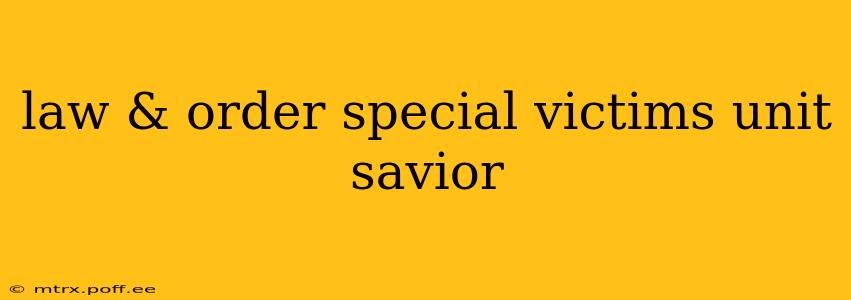Is Law & Order: Special Victims Unit a Savior? Exploring the Show's Complex Legacy
Law & Order: Special Victims Unit (SVU) has enjoyed an unprecedented run on television, becoming a cultural touchstone for its unflinching portrayal of sexual assault cases. But is it a "savior," as some might claim? The answer, like the show itself, is complex and nuanced. While SVU has undoubtedly raised awareness of important issues and brought some victims' stories to light, it also faces criticism for its occasional unrealistic portrayals and potential to perpetuate harmful stereotypes. Let's delve into the arguments.
Has SVU improved awareness of sexual assault and its consequences?
Absolutely. SVU's long run has consistently exposed viewers to the realities (though often dramatized) of sexual assault investigations, the legal processes involved, and the lasting trauma experienced by survivors. By consistently featuring these themes, the show has contributed to a broader public conversation around sexual violence, prompting more people to learn about resources and support systems available to survivors. This increased awareness is arguably one of the show's most significant positive impacts.
Does SVU accurately portray the complexities of sexual assault cases?
This is where the conversation gets more complicated. While SVU strives to shed light on these issues, critics argue that the show often simplifies complex realities for the sake of dramatic storytelling. The rapid resolution of cases, the almost superhuman efficiency of the SVU team, and the frequent depiction of perpetrators as easily apprehended and undeniably guilty can be misleading. Real-life cases are far more nuanced, often involving lengthy investigations, ambiguous evidence, and frustrating legal hurdles. This discrepancy can potentially undermine the trust of real-life survivors who may feel their experiences are not being accurately reflected.
What are some of the criticisms leveled against SVU's portrayal of sexual assault?
Several criticisms against SVU are valid and deserve attention:
- Oversimplification of Legal Processes: The show frequently streamlines complex legal procedures, making them appear far simpler and less arduous than they are in reality.
- Focus on the Perpetrator: While the show aims to center survivors' stories, the focus sometimes shifts to the dramatic capture of perpetrators, potentially overshadowing the long-term impact on victims.
- Stereotypical Portrayals: Some argue that the show relies on stereotypical portrayals of both victims and perpetrators, potentially reinforcing harmful biases and misconceptions.
- Lack of Nuance: The show's dedication to "justice" often comes at the expense of nuance. The grey areas and complexities inherent in many cases are frequently glossed over for the sake of a clear narrative.
Does SVU romanticize the work of law enforcement in sexual assault cases?
To some extent, yes. The show often portrays the detectives as almost infallible heroes, capable of solving any case with unwavering dedication and quick thinking. While the dedication of real-life law enforcement professionals is undeniable, the idealized depiction in SVU may create unrealistic expectations and potentially diminish the challenges faced by those working in the field.
Can SVU be considered a tool for education and raising awareness, despite its flaws?
Despite its shortcomings, SVU's enduring popularity and its consistent focus on sexual assault undeniably make it a powerful tool for raising awareness. While it's crucial to view the show with a critical eye, acknowledging its limitations while recognizing its contribution to broader discussions is important. The show’s impact on sparking conversations about sexual assault, even if imperfect, cannot be entirely disregarded.
Conclusion:
Labeling SVU as a "savior" is an oversimplification. While the show has undoubtedly increased awareness of sexual assault and brought important conversations to the forefront, it's crucial to acknowledge its limitations and potential to perpetuate harmful stereotypes. Its value lies in its ability to spark discussions and raise awareness, but viewers should approach its depictions with a healthy dose of critical analysis and seek out more comprehensive and accurate information from reputable sources.
